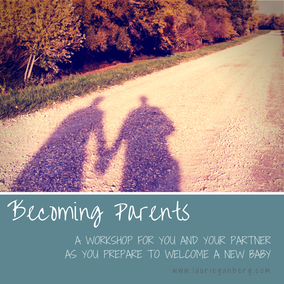 The birth, the baby gear, the dreams about what the baby is going to look like, lists of baby names, the plans for what you hope your family will do together...these are the thoughts that parents-to-be typically mull over. Time is spent picking a pediatrician and getting lost in a vortex of research about strollers or daycares or diapers. If you're pregnant, maybe you take a childbirth education class. Perhaps an infant CPR class. You're probably not thinking so much about how to take care of yourself and your relationship post-baby. But maybe you should be. Elly Taylor writes in Becoming Us: "As becoming a family gets closer, most couples are so preoccupied with the practicalities of parenting-to-be and the prospect of birth is so huge, it's hard to focus on anything else. But as you both anticipate bonding with your new baby, be aware that the bond between the two of you is equally important -- and it supports your baby, too." While there are usually totally blissful, breathtaking moments in early parenthood, there are also usually a lot of dirty, lonely, back-breaking moments. And there are some common hurdles that come up for new partners-turned-parents during these early weeks and months: communication problems, managing grandparents or in-laws, and emotional adjustments. CommunicationIt gets harder to talk if you're passing the baby off and taking turns accomplishing to-do-list items. And it gets easier to make assumptions and have expectations that don't get voiced. Sometimes it's hard to ask for help at all and one of the new parents ends up feeling like they have to do it all, while the other feels helpless to support their partner. Or, talk happens, but only about how many times the baby pooped, or the pediatrician visit, or the bills to pay. Family RelationshipsAs with every example there are exceptions, of course, but many new parents struggle with shifting the relationships they each have with their own and their partner's families. There may be significant differences in parenting philosophies, too much involvement, or not enough wished-for help. This may be the first time you find yourself telling your parent or in-law how you want something done. Or, what do you do if you don't feel comfortable leaving your baby with a family member who's begging to babysit? It can get even more complicated if your partner feels differently. Emotional AdjustmentsA mother might expect to feel overwhelmed with love the moment she sees her baby and feel like something's wrong with her if that doesn't happen right away. A parent might be so thankful for the baby that's arrived after a long struggle with infertility and yet feel overwhelmed and then guilty for not loving every moment. A new dad may wonder where he fits in and worry about how he'll bond with his breastfeeding baby. And both may love the baby but miss their simpler, pre-baby relationship. Be Prepared (as much as you can be)Spend some time now - before the baby arrives - thinking about what you will need to feel good, what your partner will need to take care of him/herself, what will you both need in order to remember over and over again that you are a team taking care of your new family together.  If you're in the Arlington, Medford, Cambridge, Somerville area, sign up for my Becoming Parents Workshop. We'll talk about the development that happens in the "fourth trimester" (for baby and parents!), communicating and parenting on no sleep, and the who/how/why/what of asking for help and getting support from your community. You'll leave with a postpartum plan of support for the whole family with specific, local resources, and some new connections with others embarking on the parenthood adventure! Comments are closed.
|
Therapy, Groups, Supervision, Consultation, Training in Seattle, WA and online in Washington state
Laurie Ganberg, LICSW, PMH-C (#LW60673320) ~ Specializing in Perinatal Mental Health, Trauma, & Fat Liberation
Now practicing through Fiddlehead Therapy, PLLC with online services and in person in Mountlake Terrace, WA
Home | Privacy | Contact | Zoom Link
© 2019-2024 All rights reserved
Laurie Ganberg, LICSW, PMH-C (#LW60673320) ~ Specializing in Perinatal Mental Health, Trauma, & Fat Liberation
Now practicing through Fiddlehead Therapy, PLLC with online services and in person in Mountlake Terrace, WA
Home | Privacy | Contact | Zoom Link
© 2019-2024 All rights reserved
